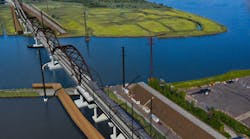OP-ED: It ain't over 'til the fat lady sings for the $33 billion gateway project
There is more to do after Govs. Phil Murphy of New Jersey and Kathy Hochul of New York signed a Memorandum of Understanding (MOU) for funding the local share of the $33 billion Gateway Program. This is before the Federal Transit Administration (FTA) will enter into negotiations with the project sponsor to approve a $14 billion Capital Investment Grant (CIG) Full Funding Grant Agreement (FFGA) for the first phase of work for the Hudson Tunnel project. FTA might contribute up to 50 percent or $7 billion. This would pay for two new tunnels across the Hudson River to Penn Station plus rehabilitation of the two existing tunnels damaged by 2012 Superstorm Sandy. Who will oversee engineering, contractors and procurement? Will it be the Gateway Development Corporation (GDC), New Jersey Transit (NJ Transit), Amtrak or the Port Authority of New York and New Jersey?
Are Govs. Murphy and Hochul, or GDC, Amtrak and NJ Transit prepared to pay for the unanticipated inevitable cost overruns? There is also contract change orders due to unforeseen site conditions and last minute scope changes. How much money is budgeted under project contingency to pay for these costs?
Have they updated the project budget to account for this year's eight percent inflation rate? What about ongoing supply chain issues, rising material costs and labor shortages, especially in special trades such as tunnel boring needed for this project. Has this been incorporated into the latest proposed budget and schedule?
There is no way of knowing if it will come in higher than the promised $14 billion for two new tunnels plus rehabilitation of the old tunnels. This scope of work does not include any additional new tracks or platforms necessary to increase capacity for both Amtrak and NJ Transit to Penn Station.
Historically as any major capital project advances through design and engineering, estimated project costs continue to rise. Responses to any construction procurement can come in above the project engineers estimate. Any final project cost upon completion could increase based upon responses to bids, along with change orders during construction due to last minute changes in scope or unforeseen site conditions, inspection and acceptance of all work that also includes quality assurance and quality control during construction followed by beneficial use, completion of contract punch list items (to insure contractor built the asset to meet design and engineering contract specifications), receipt of asset maintenance manuals followed by contract(s) closeout, release of retain age and final payment.
Amtrak, Port Authority, NJ Transit and Gateway Development Corporation must make public the details which justify both the $14 and $33 billion budgets. Without this information, riders, taxpayers, transportation advocates and elected officials will remain skeptical.
As a result of COVID-19, the world we live in has changed. Commuting patterns will be different. More people will telecommute on a part time or permanent basis. The concept of urban central business districts continue to evolve. More people will be shopping on line. More Wall Street financial institutions and Manhattan based corporations continue to downsize existing office space and/or move additional employees to suburban offices.
Was Gateway Tunnel ridership modeling dealing with promised significant increases over coming decades reevaluated in 2022?
Under any FTA FFGA, the recipient of funding is legally responsible for any cost overruns. Is the Gateway Development Corporation, Amtrak, NJ Transit, Govs. Murphy and Hochul prepared to accept this financial risk?
In 2015, the estimated cost for the full scope Gateway grew by $3.9 billion to $23.9 billion, In 2017, the new cost estimate grew another $5.2 billion to $29.1 billion. The estimated cost today is now $33.4 billion. Will this cost continue to grow over time by billions more? Will Gateway be completed by 2040 rather than the promised 2033 date?
The FTA, prior to any approved FFGA will ask its own Project Management Oversight (PMO) engineering consulting firm to conduct an independent project risk assessment for budget, construction feasibility, schedule and technical capacity of the project. This report would make for very interesting reading if ever made public. It might reveal that either the no fills $14 or the full build $33 billion Gateway Tunnel project has potential risks to become the New York version of the infamous Boston "Big Dig."
Don't be surprised if FTA doesn't come to a formal agreement with the project sponsors and offers a formal FFGA until 2023 or 2024. This FFGA if approved, would be the largest in FTA history. It ain't over until the fat lady sings.
------------------------
Larry Penner is a transportation advocate, historian and writer who previously worked for the Federal Transit Administration Region 2 New York Office. This included the development, review, approval and oversight for billions in capital projects and programs for the MTA, NYC Transit, Long Island Rail Road, Metro North Rail Road MTA Bus, New Jersey Transit along with 30 other transit agencies in NY & NJ.

Larry Penner
Larry Penner is a transportation advocate, historian and writer who previously served as a former director for the Federal Transit Administration Region 2 New York Office of Operations and Program Management. This included the development, review, approval and oversight for billions in capital projects and programs for New Jersey Transit, New York Metropolitan Transportation Authority, NYC Transit bus, subway and Staten Island Railway, Long Island and Metro North railroads, MTA Bus, NYCDOT Staten Island Ferry along with 30 other transit agencies in New York and New Jersey.




